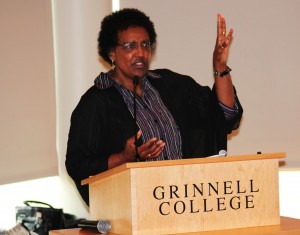By Joe Engleman
engleman@grinnell.edu
A group of students gathered Monday to participate in an intimate workshop about how to recognize and combat Chinaphobia, hosted by Kesho Scott, American Studies and Sociology, and Qianning Zhang ’13.
Chinaphobia, in its broadest sense, is racism against people with Chinese ancestry and constitutes a global phenomenon.
“[Chinaphobia] is driven by people’s fears—irrational fears—over what China might do or might not do,” Scott said. “[The workshop] was a quest for us to see that [Chinaphobia] functions as an ‘ism.’ It is a kind of racism towards people of Chinese descent, and it’s a global phenomenon.”
Zhang, Scott’s research assistant this semester, concurred.

“We don’t tolerate racism, sexism, etc. So why should we tolerate baseless attacks made on the Chinese? Contrary to the popular belief that Chinaphobia is not racism, anti-Chinese sentiment is essentially racism since many still conflate Asians with Chinese,” Zhang said.
The workshop, and Scott and Zhang’s semester-long research project, originally developed out of a conversation in one of Scott’s classes.
“I have been doing a project on the Chinese Diaspora and its history emerged when a student asked me ‘Where are the Chinese in the world and why are there so many Chinese in the continent of Africa today? Then another student said, ‘It’s a new form of colonization.’ So that small conversation led me to want to understand,” she said.
Scott and Zhang laid out a history of Chinaphobia in America, beginning with fears over Chinese immigration during the late 19th and early 20th century, concerns over cheap labor and unfair labor practices, and the some and the lasting Cold War divisions between communist and capitalist societies.
Contemporary Chinaphobia, Scott and Zhang argued, stems from Chinese ownership of some American debt and an inability to recognize continuing racism against Chinese-Americans.
“Now that they are our competitors, as an emerging capitalist country with a communist political regime, I began to notice this sort of backlash against China,” Scott said. “As China emerges as a world power, it’s increasing.”
The larger risk of not addressing Chinaphobia, both in the United States and abroad, could have profound impacts on the relationship between China, the United States and the wider world in the near future.
The most difficult obstacle to addressing Chinaphobia is getting community members to recognize and challenge Chinaphobia in their daily lives.
“We know it exists, we know it’s one of those soft power issues, the fact that we don’t talk about it, might mean we’re playing right into it,” Scott said. “When people do make Chinaphobic remarks, we don’t quite know how to handle it. … We all have to confront those limits in our human precision.”
The workshop was recorded, and is available on video at the AV Center or by getting in touch with Scott.



















































Almaz • Apr 27, 2014 at 11:57 am
Like many Chinese who spend years toiling at English lanaggue learning but still cannot achieve ‘native-like’ standard, I can easily identify and relate to this article. I’m also more than happy to see that more and more Chinese scholars and learners of English start to reflect on hegemonic ideologies attached to ‘Standard English’ and the inferior status ascribed to ‘non-native speakers’ in those ideologies. In the context that the English lanaggue has evolved into not only a global means of communication in many varieties but more importantly an identity marker for people from all corners of the world, I think there is an urgent need to redefine the term ‘bilingual’ for English speakers. The term shall move away from a definition implying ‘equal competence in two lanaggues’ to a broad definition referring to someone who can function in two lanaggues for the purposes of communication. First of all, even if two lanaggues are simultaneously acquired by someone in an ideal lanaggue environment of completely equivalent lanaggue resources (which is impossible), it is still unlikely for he/she to achieve ‘equal competence’ in all areas of the two lanaggues, let alone sequential bilinguals. Secondly, in many cases, it is not ‘poor’ English proficiency per se but the negative self-perception caused by the native/non-native dichotomy that silences ‘EFL’ and ‘ESL’ speakers. For a lanaggue that has passed into world ownership, Rampton (1990) has argued it is unacceptable and inappropriate to have the ethnic Anglo speaker as a reference point against which all other English should be measured. Now let’s come back to the question whether it is possible for a native Chinese who has no overseas experience to be bilingual in Chinese and English. Some people might say no, because they take it for granted that the pedagogical aim of EFL is to interact with ethnic Anglo-American ‘native-speakers’ in English-speaking countries. But I will say ‘yes, yes, yes ’, because ‘overseas experience’ is not a criterion against which ‘Bilingual English Speaker’ should be measured. In an increasingly globalizing world and transnational space, the principal purpose of learning English today is not to interact with speakers of L1 varieties of English but to express our diverse cultures and identities. I believe that a removal of the native/non-native dichotomy will have a positive influence on English lanaggue learning and teaching.